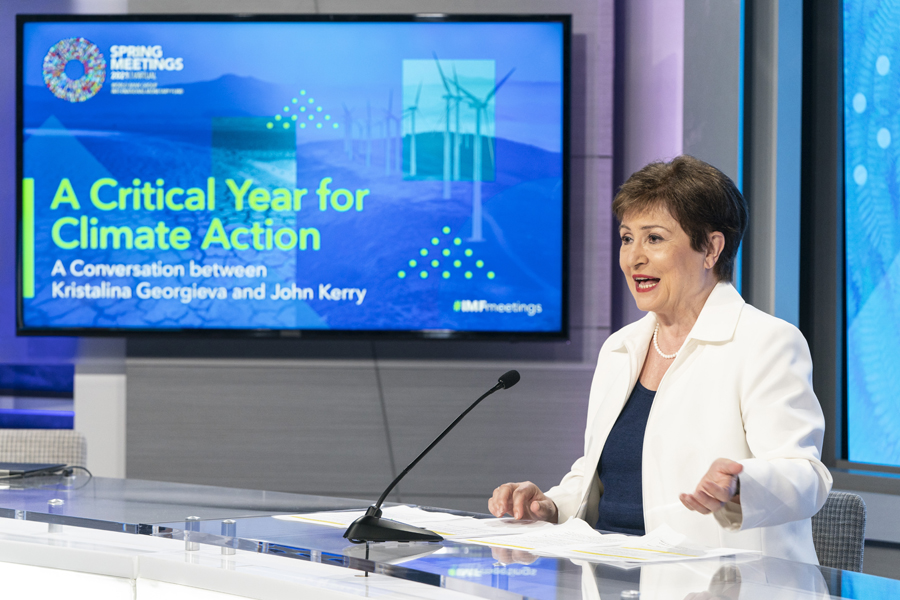IMF / Kristalina Georgieva and John Kerry on Climate Change


As the world emerges from COVID-19, there is renewed impetus to tackle climate change. Ahead of COP26, IMF Managing Director Kristalina Georgieva joined U.S. Special Presidential Envoy for Climate John Kerry to discuss how to turn climate ambitions into action while creating vibrant and inclusive opportunities as part of the transition to the new climate economy as part of IMF and World Bank Group’s Spring Meetings.
“Climate change is a growing risk to macroeconomic stability and to financial stability. But also with the same token climate action, investment in clean technologies and in climate resilience generate green growth and green jobs. This is what the IMF is all about. Stability, employment, growth. And this is why climate is now in the DNA of our institution, at the heart of our work, as we engage in policy discussions with our members. We look at how they can have more successful mitigation and adaptation strategies. As we look at financial stability, we measure climate related financial stability risks and we act on data because good data make good policy,†said Georgieva
Secretary Kerry shed a light on the new opportunities for jobs and growth a new climate economy would create
“It’s pretty basic economics. The fact is that there is incredible job opportunity, the creation of new jobs in the investments that need to be made in order to deal with the climate crisis. Let me give you an example. The Bureau of Labor Statistics of the United States says there are three jobs that will grow more than 50 percent over the next year. Number one is wind turbine technician. Number two is nurse practitioner; we know why that’s happening. And number three, a solar panel installer. It’s happening now. The market is already moving. It’s moving away from coal. It’s moving to renewables to alternative sustainable energy,†said Kerry
Managing Director Georgieva stressed on the ways in which the IMF can direct membership countries towards a greener future through Programs especially set for vulnerable countries to help them step up through good policies and fiscal space to make sound investments.
“It is hugely important that we recognize dealing with the climate crisis means mitigating, bringing emissions down, but also adapting. We need to walk and chew gum at the same time. And unfortunately, you’re so right, many countries that have done very little to nothing to create this problem are suffering the consequences. This is why it is paramount for the wealthy world to deliver on the promise of a hundred billion dollars a year between now and 2030 to help the developing world accelerate the transition to low carbon, but also adapt. And for us at the IMF, what it means is that we look at ways in which we can help these countries. And in fact, our preoccupation is with adaptation strategies. What can be done for countries to have the financial buffers so when they are hit by shock, they can act and have the means to invest in resilience,†said Georgieva.
She also added that the COVID-19 crisis is proof to how vulnerable the world is to shocks and that collaborative efforts is our way out to a more resilient world.
“We have seen in this pandemic that we are vulnerable to shocks and what is ahead of us is a more shock prone world. To build resilience to the shocks, we ought to invest in people, so they are healthy, educated, protected in tough times and resilient. We have to invest in nature. So, nature is resilient. And of course, we have to continue to invest in the resilience of our economy. I think that the pandemic has put an earring on our ear and it is don’t joke with nature. It also told us we are in this together. We have to work together to get to a more resilient world,†said Georgieva.
To watch the full event, click here





